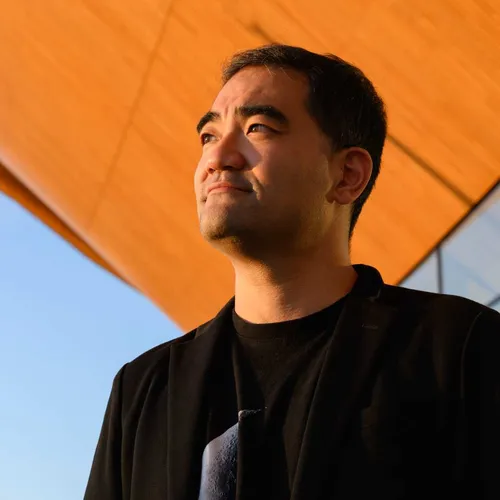
Born in Osaka, Japan in 1977, Dai Fujikura moved to the UK at age 15, where helaunched a distinguished international career as a composer. Renowned for his innovative and genre-defying works, Fujikura has received numerous prestigiouscomposition prizes and international co-commissions from leading festivals and orchestras, including the Salzburg Festival, Lucerne Festival, BBC Proms, Bamberg Symphony, Chicago Symphony Orchestra, and Simón Bolívar Symphony Orchestra.
Fujikura has served as Composer-in-Residence for the Nagoya Philharmonic Orchestra in 2014 and held the same position with the Orchestre National d'Île-de-France in 2017/18. His first opera, Solaris—co-commissioned by Théâtre des Champs-Elysées, Opéra de Lausanne, and Opéra de Lille—premiered in Paris in 2015 and has since achieved international acclaim, with new productions staged in Augsburg (2018) and again in 2020.
In 2017, Fujikura was honoured with the Silver Lion Award from the Venice Biennale and became Artistic Director of the Tokyo Metropolitan Theatre’s Born Creative Festival.His Shamisen Concerto debuted at New York’s Mostly Mozart Festival in 2019, with multiple subsequent performances worldwide. In 2020, Martha Argerich premiered his fourth piano concerto, Akiko’s Piano, and Fujikura began composing his third opera.
Fujikura’s music is released primarily on his own Minabel Records label, often in collaboration with SONY Music, and published by Ricordi Berlin. His works have been performed by eminent conductors and soloists such as Pierre Boulez, Gustavo Dudamel, Viktoria Mullova, Jean-Guihen Queyras, Claire Chase, Akiko Suwanai, and Yu Kosuge.
His second opera, The Gold-Bug (commissioned by Theater Basel), premiered in 2018,while orchestral works like Glorious Clouds and his third piano concerto, Impulse, have been performed by major orchestras across Europe and Japan. In 2019, he ventured into dance with Sounding Seven Senses, collaborating with dancer Koichi Omae, and was honored with dedicated “Portrait Concerts” at London’s Wigmore Hall and Tokyo’s Hakuju Hall.
A versatile collaborator, Fujikura works across genres, partnering with experimental and improvisational artists such as Jan Bang, Sidsel Endresen, and David Sylvian, withreleases on Jazzland Recordings and contributions to Sylvian’s album “died in the wool.” His music also features in film, notably composing for the 2019 Japanese box office hit “Mitsubachi to Enrai” (Listen to the Universe), where his piece Spring and Asura plays a central narrative role.
As a producer and curator, Fujikura has led the Born Creative Festival since 2017 and curated concerts for La Folle Journée au Japon. He is deeply committed to musiceducation, leading composition classes for children in Soma, Fukushima, as part of El Sistema Japan, where young students collaborate with international musicians and hear their works performed live.
Fujikura’s discography spans over ten albums on labels including NMC, Commmons,KAIROS, Stradivarius, SONY Music, and Minabel Records. His innovative compositiona process often involves direct digital collaboration with performers, exchanging musical ideas and recordings online.
Fujikura’s accolades include the Serocki International Composers Competition (as its youngest-ever winner), the Ivor Novello and Royal Philharmonic Society Awards, the Internationaler Wiener Composition Prize, the Paul Hindemith Prize, the Akutagawa Composition Award, and the WIRED Audi Innovation Award.
La musique est une question de communication. Pour moi, la partie la plus importante de la composition est la collaboration. En l'occurrence, avec le trompettiste Marco Blaauw. C'est lui qui m'a inspiré ce concerto. Nous nous connaissons depuis 2005. Je l'ai entendu jouer de nombreux morceaux, mais ce n'est qu'après la pandémie que nous avons commencé à travailler ensemble.
Marco voulait jouer un certain nombre de mes œuvres solo qui n'ont pas été écrites pour la trompette - notamment une pièce solo pour flûte basse et une œuvre solo pour cor. J'ai également une pièce pour sho et instruments électroniques, le sho étant un orgue à bouche traditionnel japonais, que Marco joue ensuite sur la trompette avec la partie électronique.
Il est important pour moi d’écrire de la musique avec laquelle le soliste sent qu’il peut faire ressortir ce qu'il y a de meilleur en lui. Lorsque j'ai commencé à écrire le concerto pour trompette, je connaissais très bien la façon dont Marco jouait ma propre musique. J'ai envoyé à Marco des fragments de ma musique, il l’a enregistrée et me l’a renvoyée. J'ai ensuite écouté ses enregistrements et cela m'a inspiré pour écrire la partie suivante, et ainsi de suite. L'une des principales questions était de savoir comment faire sonner la trompette de manière sensuelle sans donner une impression de fanfare ou d'un quelconque son de cuivre puissant. Je suis un grand amateur de cuivres, mais je n'aime pas le son typique des cuivres dans la musique classique. J'ai récemment enregistré l'album The Bow Maker avec deux trompettistes fantastiques du monde du jazz nordique et l'artiste norvégien Jan Bang.
Le Concerto pour trompette ne contient aucun élément d'improvisation, mais je suis certain que tout ce que je vis dans la vie se retrouve dans mon travail quotidien.
DAI FUJIKURA
Texte traduit de l’anglais